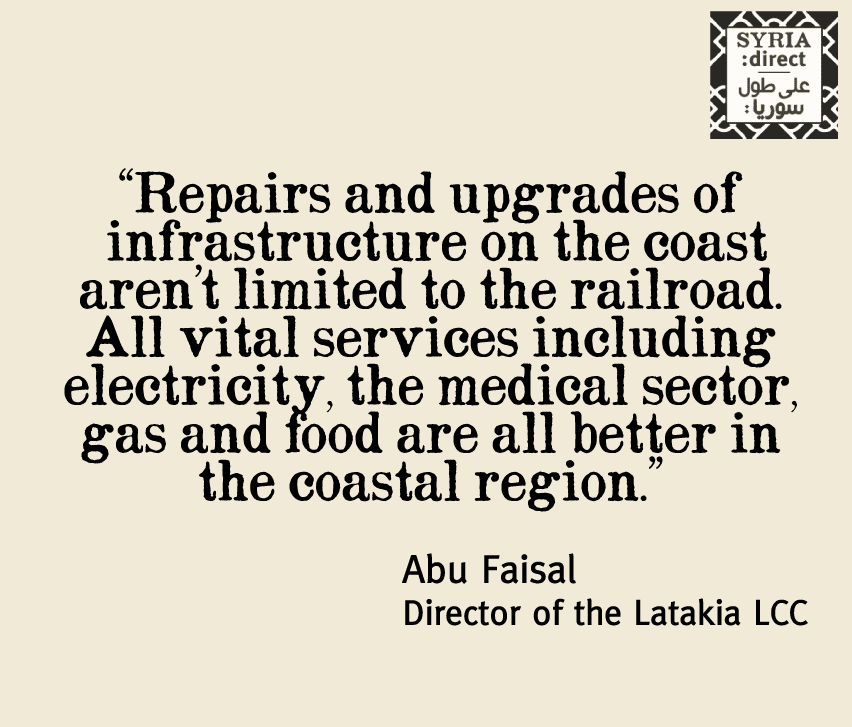New rail line opens in coastal heartland
Syrian officials presided over the reopening of the Latakia train […]
24 November 2015
Syrian officials presided over the reopening of the Latakia train station last week after the completion of a new rail line running along the coast, where the regime still enjoys popular support within the Alawite-majority coastal provinces of Tartus and Latakia.
The newly operational line between the port cities of Latakia and Jabla, in Tartous province, revitalizes the Latakia train station, one that was taken out of service following rebel advances around nearby Jisr al-Shughour in 2011.
Abu Faisal, the director of the Latakia Local Coordination Council, a network of opposition activists spreading local news online, tells Syria Direct’s Abdulrahman al-Hourani that while the regime fails to provide basic utilities in many other provinces, it goes out of its way to maintain its popular base in the region that the Assad family hails from.
“The regime is making an effort to keep its supporters happy after the losses that it has endured in recent battles.”
Q: Why did the regime choose to re-open a train station amidst the ongoing economic difficulties in the country?
The reason given was to ease the difficulty citizens faced travelling between the two cities, however, there is more to the issue than that. The train runs between Tartus and Latakia city, and the distance doesn’t call for a railway. All the cities of the coast are close to each other; the distance between Latakia and Jabla is only about 25 kilometers.
It could be that the military intends to use it to transport large amounts of troops between the two ends of the coast depending on the need. There is a port and a Russian military base in Tartus, and Russian training grounds and barracks in the city of Latakia. The Hamamin (Basel al-Assad) airport is also located in Jabla. Making transportation easier and quicker between these areas benefits the regime militarily more than it does in terms of civil administration.
Q: What do you think the regime gains by neglecting the infrastructure in other areas of the country?
The regime is making an effort to keep its supporters happy after the losses that it has endured in recent battles. Repairs and upgrades of infrastructure on the coast aren’t limited to the railroad. All major fields including electricity, the medical sector, gas and food are all better in the coastal region than elsewhere in Syria. As the region contains much of the regime’s popular support, this phenomenon has increased, especially as much of the regime’s opposition left the coast because of the pressure put on them by security services.
Q: How will this new train station be received by regime supporters and the opposition?
It will likely increase resentment among those people living in other provinces as the regime focuses on making sure its partisans are content in the province where it was born [Hafez al-Assad was born in the village of Qardaha in Latakia]. It neglects the other provinces unless there is an ongoing battle there.
This is all the more noticeable as winter sets in and thousands of citizens are displaced facing countless difficulties of all kinds. This includes moving between provinces, a lack of electricity and a water crisis; all things that should be the regime’s priority.







